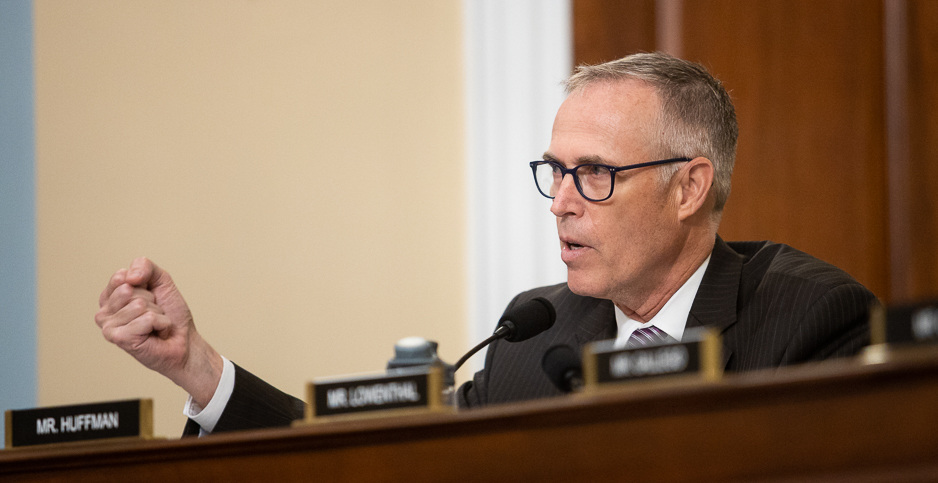Lawmakers push watershed restoration, climate spending

Rep. Jared Huffman (D-Calif.), chairman of the Natural Resources Subcommittee on Water, Oceans and Wildlife, on Capitol Hill last year. Francis Chung/E&E News
House lawmakers yesterday explored investments in coastal restoration and water projects, potentially as part of an infrastructure bill based around President Biden's "Build Back Better" agenda.
During a House Natural Resources Subcommittee on Water, Oceans and Wildlife hearing, Democrats pointed to natural infrastructure, as well as resilience projects to protect against sea-level rise, drought and wildfires, as ways to create jobs and spur the economy after COVID-19.
It was a focus of the 2009 stimulus Congress passed under President Obama, which offered millions of dollars for coastal habitat projects through NOAA.
"We can protect, we can provide grant money to put people to work on shovel-ready coastal restoration projects, like we did after the 2009 crash and that recovery," said subcommittee Chairman Jared Huffman (D-Calif.).
"We can promote similar grants for blue carbon ecosystem restoration projects," said Huffman, "projects that sequester carbon and protect our coasts from storms."
Coastal habitat restoration offers 17 jobs for every million dollars invested, a higher return rate than some extractive industries, Laura Ziemer, senior counsel and water policy adviser at Trout Unlimited, said in her written testimony.
Cassandra Moseley, a research professor and senior policy adviser at the University of Oregon's Ecosystem Workforce Program, offered a similar statistic.
In Oregon, her research found, every million dollars invested in water and forest restoration generates 15 to 24 jobs.
NOAA's Habitat Conservation and Restoration Program offers an investment opportunity in coastal communities, Ziemer added, while Congress could further boost freshwater ecosystem projects through the Fish and Wildlife Service's National Fish Passage and Partners for Fish and Wildlife programs.
"I think our biggest lesson learned from the 2009 package, especially with a decade more of the climate change trends expressing themselves in water and fire in the West — drought and wildfire — is that we need to do more across all of those areas," Ziemer told the panel.
Hydro, forests
Republicans focused on hydropower and forest management — two areas that have emerged as points of emphasis for the GOP in debates about climate change policy.
Natural Resources ranking member Bruce Westerman (R-Ark.) noted that "this country still has not tapped into 12,000 megawatts of capacity that can be added to existing dams."
While Westerman said natural infrastructure projects and coastal restoration are often bipartisan, he also warned against Democrats' emphasis on federal spending.
"Before we start pouring more money into the agencies under the subcommittee's jurisdiction, we should hear from these agencies on exactly how they plan to spend the massive amount of American taxpayer dollars and implement the new programs from the last omnibus appropriations bill," he said. "That's just good governance."
But with rock-bottom interest rates and decaying infrastructure around the country, Huffman argued that now is the time to spend.
"In the past 30 years, the federal contribution to water infrastructure spending has fallen from 63% of total capital spending to a mere 9% in recent years, so the need is great, but so is the opportunity," Huffman said.
"And part of that opportunity is the fact that interest rates are effectively at zero right now, so we can borrow our own money free of charge to do some of this important work."
By: Nick Sobczyk
Source: E&E News Reporter
Next Article Previous Article
